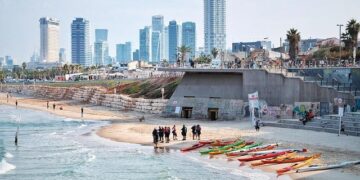As the world accelerates efforts to combat climate change, the Middle East finds itself increasingly marginalized in global climate finance initiatives. Despite being home to some of the planet’s most climate-vulnerable countries, the region has struggled to secure substantial funding for mitigation and adaptation projects. This growing disparity raises critical questions about the priorities and mechanisms driving international climate finance, and what it means for the Middle East’s ability to navigate an uncertain environmental future.
Challenges in Aligning Regional Priorities with Global Climate Finance Criteria
Global climate finance frameworks often operate on a set of predefined criteria that prioritize specific development indicators, emissions reduction targets, and governance structures. However, these parameters frequently overlook the unique socio-economic and environmental realities of Middle Eastern countries. For instance, many regional economies are heavily dependent on fossil fuels, making transitions to clean energy economically complex and politically sensitive. Furthermore, the focus on measurable metrics such as renewable energy capacity or immediate carbon cuts can sideline investments in climate adaptation projects crucial for the region’s resilience against extreme heat and water scarcity.
Key obstacles faced by Middle Eastern nations include:
- Rigid eligibility rules that fail to account for hydrocarbon-based economies
- Insufficient appreciation of climate adaptation needs unique to arid climates
- Limited technical capacity to align regional climate strategies with international reporting standards
- Inadequate engagement with local stakeholders in global funding mechanisms
| Challenge | Global Finance Criteria | Middle East Context |
|---|---|---|
| Eligibility | Low fossil fuel dependence | High oil and gas reliance |
| Project Focus | Emission reduction | Adaptation & water security |
| Reporting | Standardized frameworks | Diverse institutional capacity |
| Stakeholder Inclusion | International partners | Local communities underrepresented |
The Impact of Political and Economic Instability on Funding Access
Political volatility combined with economic uncertainty severely restricts the Middle East’s ability to secure substantial funding from international climate finance mechanisms. Frequent regime changes, conflicts, and shifting alliances create an environment where investors and global funds hesitate to commit resources. Additionally, economic instability characterized by fluctuating oil prices, inflation, and unsustainable debt levels further diminishes confidence in long-term climate projects. This environment not only dissuades private investment but also hampers public sector capacity to meet co-financing requirements or implement necessary policy reforms demanded by global funding bodies.
Much of the region’s struggle to attract climate finance stems from several intertwined factors:
- Lack of Transparent Governance: Investors seek predictability and clear regulatory frameworks, which are often absent or inconsistent in unstable states.
- Creditworthiness Concerns: High sovereign debt and poor fiscal management impair countries’ ability to offer financial guarantees.
- Security Risks: Active conflicts or fragile security situations elevate perceived risks for international donors and financiers.
| Factor | Impact on Funding Access |
|---|---|
| Regime Instability | Delays approval processes and policy consistency |
| Economic Volatility | Unpredictable budgets and financial gaps |
| Security Challenges | Increased insurance and risk mitigation costs |
| Debt Burden | Limits fiscal space for climate investments |
Strategies for Enhancing Middle East Engagement in International Climate Initiatives
The Middle East’s participation in international climate initiatives remains limited due to a mix of geopolitical complexities, economic structures, and a heavy reliance on fossil fuel revenues. To bridge this gap, regional governments must prioritize diversifying their energy portfolios by investing in renewable technologies such as solar and wind, which align with the region’s natural advantages. Strengthening partnerships with global climate funds and embracing transparent reporting standards can also enhance trust and unlock new financial flows. Moreover, fostering collaboration between public institutions and private sectors will create an ecosystem conducive to innovation and large-scale climate projects.
Effective engagement hinges on addressing capacity gaps through knowledge-sharing platforms and tailored technical assistance, boosting the region’s ability to design and implement impactful climate solutions. Policymakers should focus on policy reform that incentivizes green investments and integrates climate risk assessments into national development plans. Below is a summary of key strategic actions:
- Energy Diversification: Accelerate renewable energy adoption.
- Financial Integration: Improve access to global climate finance mechanisms.
- Capacity Building: Enhance technical expertise and data transparency.
- Policy Innovation: Introduce regulatory frameworks that support sustainable investments.
| Strategy | Target Outcome | Timeframe |
|---|---|---|
| Renewable Energy Projects | 50% increase in solar installations | 5 years |
| Climate Finance Access | Streamlined funding approvals | 3 years |
| Capacity Development | Trained climate professionals | 2 years |
| Regulatory Reform | Green investment incentives | 4 years |
Key Takeaways
As the global community intensifies efforts to combat climate change, the persistent underinvestment in the Middle East’s climate initiatives highlights a critical gap in international finance mechanisms. Without a strategic shift to include this region more equitably, the Middle East risks falling further behind in building resilience against escalating environmental challenges. Closing this financing divide will require both increased awareness and coordinated action from global funders, policymakers, and regional stakeholders-ensuring that climate solutions are truly inclusive and effective for all.














